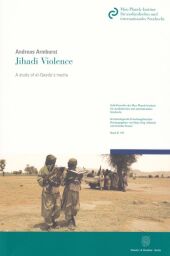 Neuerscheinungen 2013Stand: 2020-01-07 |
Schnellsuche
ISBN/Stichwort/Autor
|
Herderstraße 10
10625 Berlin
Tel.: 030 315 714 16
Fax 030 315 714 14
info@buchspektrum.de |

Andreas Armborst
Jihadi Violence
A study of al-Qaeda´s media
2013. XII, 266 S. Tab., Abb.; XII, 266 S. 224 mm
Verlag/Jahr: DUNCKER & HUMBLOT 2013
ISBN: 3-428-14049-4 (3428140494)
Neue ISBN: 978-3-428-14049-7 (9783428140497)
Preis und Lieferzeit: Bitte klicken
Many speculations revolve around the political goals of Islamists and jihadists. What is it that al-Qaeda think they can achieve through political violence? This book provides clear answers to this and other important questions. Based on the systematic analysis of claims of responsibilities and video messages of al-Qaeda leaders, it opens intriguing insights into the world view and mindset of the jihadi movement. Thereby it enables the reader to gain a clearer picture of the political-religious program of Islamism and to better distinguish between its radical and moderate political claims.
Many speculations revolve around the political goals of Islamists and jihadists. What is it that al-Qaeda think they can achieve through political violence? This book provides clear answers to this and other important questions. Based on the systematic analysis of claims of responsibilities and video messages of al-Qaeda leaders, it opens intriguing insights into the world view and mindset of the jihadi movement. Thereby it enables the reader to gain a clearer picture of the political-religious program of Islamism and to better distinguish between its radical and moderate political claims. This knowledge is important because political Islam and jihadi violence not only is an increasingly important topic in domestic politics, but also became, through the Arab Spring, a tangible factor in foreign affairs.
In al-Qaeda´s ideology theological and political arguments are blended into a coherent media strategy. Political claims and grievances are convincingly backed up by quasi-journalistic evidence, whereas theological arguments are complemented by legal references to the Quran and Sunna. In addition, the jihadi leaders provide doctrines and strategies describing how the use of force can defend Islam against its perceived three existential threats - the global conflict, Arab despotism and secular governance. Theological and strategic considerations converge in al-Qaeda´s rationale for violence.
1. Introduction: Aim and outline of the study
A. Models, concepts, and theories
2. Modeling terrorism and political violence: Three criminological anomalies of terrorism - Challenges for impartial research on crime and terrorism - Terrorism: Political violence or political label? - Summary
3. Modeling jihadism: Islamic activism - Jihad in the book: The dogmatic dimension of jihadism - Jihad in action: The military history of jihad - Summary
B. Empirical part
4. Methodology: Research in the social sciences - Research methods for analyzing jihadi media - Research design and method of the study
5. The ideology of jihadism
6. Mapping AQ´s ideology: Frames, narratives, themes, and issues in jihadi media: The socio-political analysis of jihadism - The goals of AQ - The means: Doctrines and strategies of jihad
7. Jihadism in Iraq: The conflict in Iraq - Jihadi ideology in action: Claims of responsibility of AQI and AAS - Ideological alignment of AQ central and AAS/AQI - Conclusion
8. Summary, conclusions, and outlook
Bibliography
Annex


